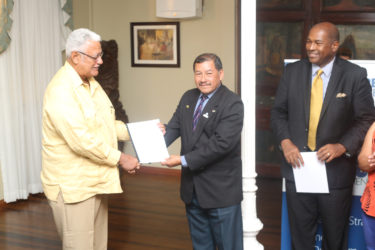Protocols and draft legislation have been completed for a catch-and-release sport fishing project in the North Rupununi aimed at preserving the Arapaima, while promoting eco-tourism.
The handing over of the documents to Minister of Indigenous Peoples’ Affairs Sydney Allicock yesterday at the Cara Lodge marked the culmination of the first phase of the
Catch-and-release Arapaima Sport Fishing Project, which has been supported by private sector investment support programme Compete Caribbean.

According to a project summary on the Compete Caribbean website, the aim of the project is to improve the capacity and competitiveness of the Rupununi Catch and Release cluster—which comprises the Karanambu, Surama and Rewa eco-lodges–and to introduce and market catch-and-release sport fishing as a viable eco-tourism product in Guyana.
It noted that a key output of the project is a robust regulatory framework for sustainable management of the Arapaima and Catch-and-Release activity based upon data and best practices research carried out under the project. Further, it said the cluster intends to engage the Government of Guyana and advocate for the proposed framework to encourage countrywide adoption, use and enforcement of sustainable practices going forward.
Speaking at the press conference hosted by the North Rupununi cluster yesterday, Tourism Minister Cathy Hughes thanked Compete Caribbean for what she dubbed “a dynamic product,” which she said has already had an impact on the development of the tourism industry.
“We know we have great natural beauty and we know we have enticing people of six dynamic races and we have vision and drive but as you know you can have all of that and if you haven’t got the dollars you cannot translate it into something real,” she said.
Hughes pointed that research shows that persons are more opened to experiencing eco-tourism than taking pictures in front of the statues and that is where Guyana’s tourism gemstone, the Rupununi, becomes vital.
She noted that the ministry recognises sports fishing as an import niche in the industry and acknowledges that they would not have been able to develop it without the help of Compete Caribbean and the cluster.
Allicock also lauded the project for promoting tourism and offering protection to the endangered species. He explained that years ago the price for the Arapaima meat had skyrocketed in Brazil, prompting people from the local community to aggressively harvest the fish to sell in Brazil.
As a result, the communities began lobbying for a management plan. He said that they were eventually given a plan and the opportunity to monitor the species pool and lauded Compete Caribbean for working along with the same goals. In addition to securing the protection of the species, he said that the programme has vastly affected the community in very positive ways. “I can tell you that within the three communities, we have seen the confidence of our people and have seen partnership, trust and accountability,” he said, while adding that he hopes they will be able to use the protocols and legislation to better manage the species and protect it.
Attorney Nigel Hughes, who handed over the documents, said the draft legislation is aimed at implementing scientifically based protocols to encourage the proper management and the sustainable development of the arapaima, to regulate catch and release activities in the Rupununi and to develop protocols which will minimise stress from the activity and increase existing stocks as well as prolong life. “What happens is that the experience of catching and releasing you pay for and you can come back again and can do it again and it does not have an influence on reducing the pool of the Arapaima,” he explained.
Executive Director of Compete Caribbean Sylvia Dohnert explained that the programme is wider than Guyana and covers 15 other Cariforum countries. She said that it was conceived to assist the private sector and works directly with the private sector in order to stimulate innovativeness and competiveness in the region and work with the governments of the region to enhance the climate in which the private sector operates. She pointed out that there are currently 98 projects across the 15 countries, including nine cluster projects similar to the North Rupununi project.
Inter-American Development Bank country representative Sophie Makonnen also spoke about the projects impact on the country and lauded its impact on the tourism and creation of jobs within the communities.









